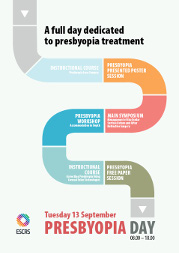Posters
Functional vision comparison of trifocal and extended-range-of-vision IOLs
Poster Details
First Author: M. Pande UNITED KINGDOM
Co Author(s): E. Proudfoot A. Bourne
Abstract Details
Purpose:
Monocular functional vision assessment is a validated tool to assess IOL performance invivo. The purpose of this study was to compare the functional vision performance of Trifocal and Extended Range of Vision IOLs
Setting:
Private Practice and Research Centre
Vision Surgery and research centre, UK
Methods:
Uncorrected and distance corrected monocular functional vision was assessed using the PANFOCAL VA system in 2 cohorts of 30 consecutive patients who had refractive lens exchange and refractive cataract surgery using the Finevision Trifocal IOL and the Symphony Extended Range of Vision IOL. A monocular objective task assessment in photopic and mesopic conditions was also carried out.
Results:
Functional Vision assessment demonstrated subtle differences between the two groups. Intermediate vision and Intermediate vision task performance was better with the extended range of vision IOL compared to the Trifocal IOL. Photopic near vision and photopic near vision task performance was better in the Trifocal group. Mesopic near vision and mesonic near vision task performance was poor in both groups. Residual Defocus and Torus altered the functional vision performance of both IOLs.
Conclusions:
Functional vision and objective task assessment showed subtle but significant differences in eyes with Trifocal and Extended range of vision IOLs. The performance of both IOLs was consistent with their optical design. Residual defocus and torus modified the functional vision performance of both IOLs.
Financial Disclosure:
One or more of the authors receives consulting fees, retainer, or contract payments from a company producing, developing or supplying the product or procedure presented, One or more of the authors travel has been funded, fully or partially, by a company producing, developing or supplying the product or procedure presented, One or more of the authors receives consulting fees, retainer, or contract payments from a competing company





